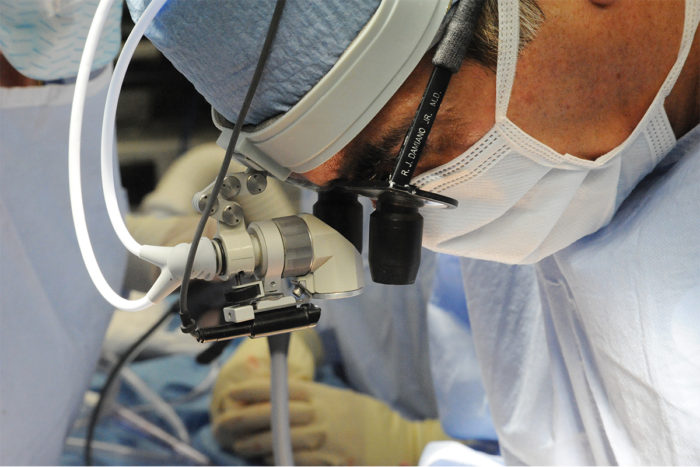Remote heart monitoring to detect asymptomatic atrial fibrillation
A new study will test if patients with irregular heartbeats who have undergone surgery benefit from constant heart rate monitoring

Chief of cardiac surgery, Ralph Damiano Jr., MD, helped refine and update treatments for atrial fibrillation, or an irregular heartbeat.
Ralph Damiano Jr., MD, chief of cardiac surgery at Washington University, is heading a new study to determine whether patients who have undergone surgical ablation, a procedure that applies scars to the heart’s surface to block signals causing the heart to misfire, benefit from constant heart rate monitoring.
Patients who have had successful ablation treatment for irregular heartbeats called atrial fibrillation (AF) often feel nearly or completely cured. However, an investigational device—the Medtronic implantable Reveal® XT—has shown that many patients who seem to experience few or no symptoms continue to have AF episodes.
“Detecting asymptomatic atrial fibrillation is important,” Damiano says. “The most feared complication of AF is a stroke, and it is possible that even short episodes of AF may make the patient predisposed to stroke.”
Device is size of a flash drive
The device, about the size and shape of a flash drive, is implanted under the skin. It can record up to three years of a patient’s heart rate data and can detect and record when a patient is in AF. Patients who know or suspect they are having an episode can place a special monitor over the implanted device and transmit via phone an immediate ECG and the data from the past two weeks to their physicians.
Washington University School of Medicine in St. Louis and Northwestern University in Chicago will enroll 50 patients who have previously had surgical ablation. While the Reveal® XT monitor has been extensively studied in patients who have had catheter ablation, the surgical ablation population has not been rigorously evaluated.
“In my opinion, this is the future of medicine,” Damiano says. “Decentralizing patient care to their homes could eliminate unnecessary trips to the doctor or hospital and lead to better and more efficient care.”






